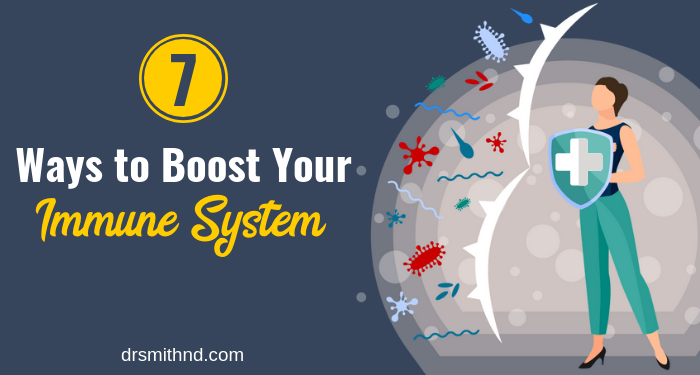Do you catch colds easily, or get sick a lot?
If so, your immune system may be compromised.
The cause of depressed immune systems range from an unbalanced diet to exposure to mold and chemicals, or to autoimmune diseases.
Boosting your immune system is essential to living a healthy life. The immune system plays an important role in fighting off bacterial, parasitic and viral infections while also restricting the growth of tumours inside the body.
Symptoms of a Suppressed Immune System
According to the experts from the prestigious Mayo Clinic in New York, the main symptoms of a suppressed immune system include:
- Frequent and recurrent pneumonia, bronchitis, sinus infections, ear infections, meningitis or skin infections
- Inflammation and infection of internal organs
- Blood disorders, such as low platelet counts or anemia
- Digestive problems, such as cramping, loss of appetite, nausea and diarrhea
- Delayed growth and development
- Autoimmune disorders, such as lupus, rheumatoid arthritis or type 1 diabetes
How To Boost Your Immune System
In recent years, scientists have discovered hundreds of things that suppress our immune systems. While many of these are a result of a genetic lottery (some of us just HAVE more weakened immune systems than others), others can be controlled.
In other words, this means that environmental factors and lifestyle choices contribute to weakening our immune systems, causing a number of conditions that range from mere colds to more serious things like cancer.
Here are seven things you can start doing right now to boost your immune system:
1. Beware of Vitamin Deficiencies
In order to function properly, our bodies need the proper amount of vitamins and minerals. These vitamins feed vital cells in our immune system, allowing them to grow. They also give them the energy they need to find and destroy germs.
Poor food choices and things like digestive tract issues that hinder good nutrition also deplete our immune system of the energy it needs to work correctly. That’s why a whole foods, organic diet full of healthy fats, low on inflammatory grains, and high on quality protein and vegetables go a long way in terms of supporting us, even at the deepest level. No medicine goes a further distance than what is on your fork.
Common vitamin deficiencies that lead to a suppressed immune system include Vitamin D, Vitamin B12 and Iron. Today, we have tests that can easily show if you are lacking these vitamins. We also have easy ways to replenish them — like supplements and diet overhauls — that will help boost your immune system.
One of the most potent ways to boost your immune system is by getting intravenous vitamin infusions that ensure optimal levels of nutrients and help prevent various infections by supporting your immune system on a cellular level. To see the spectrum of unique formulas we work with click here, however, we always customize them to some extent depending on our goals.
2. Avoid Exposure to Mold and Chemicals
Exposure to certain toxins such as those found in mold spores and other toxins has been proven to have an impact on our immune systems.
In 2000, a group of scientists in Washington DC at the Environmental Working Group, spearheaded a series of groundbreaking investigations on the pollution in people, from newborns and grandparents to mothers and teens. They found pollutants in everyone. And they’ve found hundreds altogether, in combinations that have never been tested for safety.
The toxins many people have in their bodies revealed by these studies exposes alarming gaps in the scientific understanding of our exposures and in our system of public health protection. In one study conducted they discovered that 457 of 538 chemicals tested were found in the blood, urine, umbilical cord blood of infants, and breast milk from a sample of 94 people.
3. Manage Stress
Stress has been proven to have a major negative impact on your immune system.
When you experience continued stress, your adrenal glands release extra cortisol to help your body cope. These elevated cortisol levels impact the production of prostaglandins, which support healthy immune function, causing inflammation and immune suppression.
Studies have shown that during a period of elevated cortisol levels, Natural Killer Cells, which are vital pieces of our immune system, die off, reducing our body’s ability to fight off foreign invaders.
In this context, it is evident that managing stress through things like counselling, massage, meditation, yoga, or hobbies is a great way to boost the immune system.
4. Create a Regular Sleep Schedule
Good sleep is essential for immune system health.
A study conducted in 2012 found that sleeping fewer than seven hours each night can significantly impair the ability of the immune system to work properly. That’s because during sleep, the immune system releases proteins called cytokines, which help fight infection and inflammation.
The same study found that infection-fighting antibodies and cells were also reduced during periods of reduced sleep, which explains why the researchers observed that immune response in subjects who slept four to six hours per night was much lower than that of those who slept seven to nine hours.
Creating a regular sleep schedule that allows you to sleep eight hours a night is a great way to make sure
5. Lay Off the Booze
Drinking too much alcohol can also reduce the ability of white blood cells in your body to kill germs.
Researchers have proven that there is an association between excessive alcohol consumption and adverse immune-related health effects such as susceptibility to pneumonia. In recent decades, this association has been expanded to a greater likelihood of acute respiratory stress syndromes (ARDS), sepsis, alcoholic liver disease (ALD), and certain cancers; a higher incidence of postoperative complications; and slower and less complete recovery from infection and physical trauma, including poor wound healing.
Clinicians believe that this occurs because excessive alcohol can impair the ability of the immune cells to function properly, increasing your risk of infectious diseases and cancer. While moderate alcohol consumption is probably not dangerous, making sure you keep your booze in check is a great way to keep your immune system in good shape.
6. Exercise More
Getting regular exercise has been scientifically proven to boost your immune system. Studies have shown that exercise helps strengthen the cells in your body that attack bacteria. These cells also appear to work more slowly in people who do not exercise, showing a causal relationship between exercise and a healthy immune system.
7. Quit Smoking (there are people still smoking?!)
We have known for a while that smoking can increase your risk of lung cancer. Did you know that smoking, or even second hand smoke, can weaken or damage your immune system? Cigarettes contain more than 4,000 chemicals, all of which are extremely toxic to the body.
Can’t Figure Out Why You Have a Weakened Immune System? Come in for a Visit.
Many people with poor immune response fail to get concrete answers from medical doctors. These doctors, while invaluable to our health, many times are not trained to determine if your weakened immune system is the result of things like mold or chemical exposure.
If this is your case, you should definitely give us a call.
If there are aspects of your case that may indicate some kind of toxic exposure, I take a thorough environmental exposure history regarding residential, occupational, medical and dental exposures. I then use urine and blood tests to identify the presence of heavy metals, solvents, pesticides, herbicides and other chemicals that are stored in the body to show evidence of toxic exposures.
These tests also allow me to see if there are any vitamin deficiencies leading to a weakened immune system, allowing me to prescribe treatment options that will help get things back on track. These treatment options can include IV therapies, lifestyle and dietary overhauls and other naturopathic options.
In other words, I will be able to determine what is causing your immune system to become suppressed, and how to boost it.
For a complimentary 15-minute consultation (in office or by phone) to discuss your unique situation, please call the office at (416) 929-0707.



